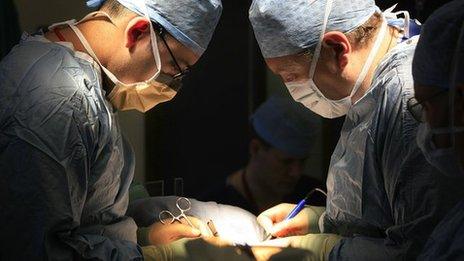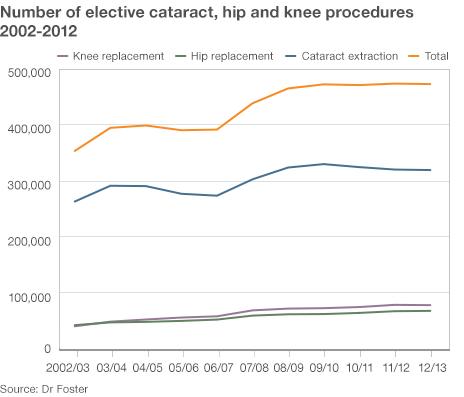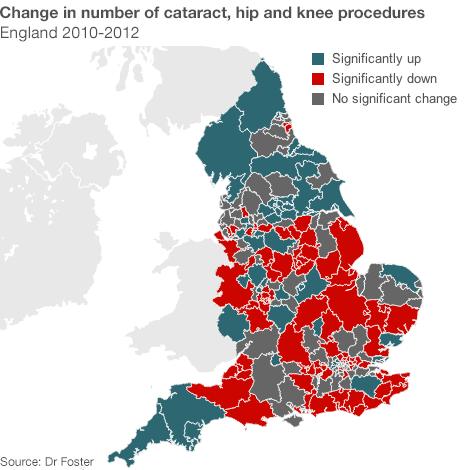Key NHS operations 'being rationed'
- Published
- comments

Dr Foster has been looking at what the NHS has been spending its money on
The NHS in England appears to be rationing access to vital non-emergency hospital care, a review suggests.
The analysis by the Dr Foster research group looked at three key procedures - knee, hip and cataract operations.
For much of the past decade, patient numbers have been rising as would be expected with an ageing population.
But since 2010, the numbers have levelled off - with just one in eight areas now doing more hips and knees and one in five seeing rises in cataracts.
It comes amid mounting pressures on the health service.
The challenges facing A&E units have been well documented, but reports have also been emerging that non-emergency care is being squeezed too.
'Highly effective'
These findings - to be published on Monday in Dr Foster's annual hospital guide - provide perhaps the most comprehensive picture yet of what is happening.
The health care analysts looked at the number of operations being carried out for the three types of procedures - among the most life-enhancing done by the NHS - for the past decade.

It found virtually no change in the overall numbers over the past two years with the total numbers hovering around the 475,000 mark each year.
Hip replacements were the only treatment out of the three that were still going up - although the rate of increase has slowed.
Meanwhile, the number of cataract operations is at its lowest level for five years and 2012-13 saw the first fall in knee replacements for a decade.
The review also provided details of what local areas were up to by looking at the individual figures for the 200-plus clinical commissioning groups which are now in charge of local health budgets.
'Very concerning'
The data showed that just 27 (13%) areas saw a significant rise in knee replacements over the past two years, 27 (13%) a rise for hip replacements and 40 (19%) a rise for cataracts.
Roger Taylor, co-founder of Dr Foster, said the findings suggested the squeeze on spending was having an impact on these "highly effective" treatments.
"There has been a sharp slow-down in activity. We are seeing some operations fall when normally we see them increasing by 4%, 5% or 6% a year."



The review will also highlight other areas of concern.
Dr Foster analysed data on what it called "ineffective operations".
These include procedures such as tonsillectomies and knee washouts where the benefits are marginal.
While overall the numbers being done had fallen by 8% in the past five years there are still 124 areas where their use has increased since 2010-11.
Mr Taylor added: "Money is being wasted on care that is of no benefit."
Colin Howie, vice president of the British Orthopaedic Association, said the findings were "very concerning".
"By trying to save money in the short term, it will cost the NHS and society in the long term. These are highly effective operations because they restore mobility and reduce disability.
"What is more, the research shows it is the most vulnerable in society - the elderly and poor - who are most likely to miss out."
A spokesman for NHS England said: "While the data raises important questions, we should be wary of leaping to the answers.
"Cataracts, knees and hip replacements are generally 'good' but it is still the case that they can be overused.
"We do a very significant number of these operations all over the country and it should not be taken as a given that this figure should automatically increase."
- Published6 December 2013
- Published19 June 2012
- Published22 May 2012
- Published12 June 2012
- Published24 May 2012
- Published15 May 2012
- Published23 June 2010